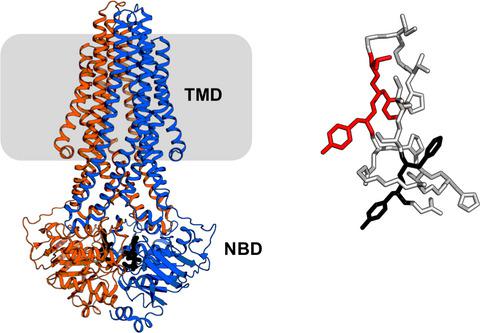当前位置:
X-MOL 学术
›
FEBS Lett.
›
论文详情
Our official English website, www.x-mol.net, welcomes your
feedback! (Note: you will need to create a separate account there.)
Self‐immunity to antibacterial peptides by ABC transporters
FEBS Letters ( IF 3.0 ) Pub Date : 2020-10-22 , DOI: 10.1002/1873-3468.13953 Sander H J Smits 1, 2 , Lutz Schmitt 1 , Konstantinos Beis 3, 4
FEBS Letters ( IF 3.0 ) Pub Date : 2020-10-22 , DOI: 10.1002/1873-3468.13953 Sander H J Smits 1, 2 , Lutz Schmitt 1 , Konstantinos Beis 3, 4
Affiliation

|
Bacteria produce under certain stress conditions bacteriocins and microcins that display antibacterial activity against closely related species for survival. Bacteriocins and microcins exert their antibacterial activity by either disrupting the membrane or inhibiting essential intracellular processes of the bacterial target. To this end, they can lyse bacterial membranes and cause subsequent loss of their integrity or nutrients, or hijack membrane receptors for internalisation. Both bacteriocins and microcins are ribosomally synthesised and several are posttranslationally modified, whereas others are not. Such peptides are also toxic to the producer bacteria, which utilise immunity proteins or/and dedicated ATP-binding cassette (ABC) transporters to achieve self-immunity and peptide export. In this review, we discuss the structure and mechanism of self-protection that is conferred by these ABC transporters.
中文翻译:

ABC转运蛋白对抗菌肽的自我免疫
细菌在某些压力条件下会产生细菌素和小菌素,它们对密切相关的物种具有抗菌活性以求生存。细菌素和小霉素通过破坏细胞膜或抑制细菌靶标的基本细胞内过程来发挥其抗菌活性。为此,它们可以裂解细菌膜并导致其完整性或营养随后丧失,或劫持膜受体进行内化。细菌素和小菌素都是核糖体合成的,其中一些是翻译后修饰的,而其他则不是。这些肽对生产细菌也有毒性,生产细菌利用免疫蛋白或/和专用的 ATP 结合盒 (ABC) 转运蛋白来实现自身免疫和肽输出。在这次审查中,
更新日期:2020-10-22
中文翻译:

ABC转运蛋白对抗菌肽的自我免疫
细菌在某些压力条件下会产生细菌素和小菌素,它们对密切相关的物种具有抗菌活性以求生存。细菌素和小霉素通过破坏细胞膜或抑制细菌靶标的基本细胞内过程来发挥其抗菌活性。为此,它们可以裂解细菌膜并导致其完整性或营养随后丧失,或劫持膜受体进行内化。细菌素和小菌素都是核糖体合成的,其中一些是翻译后修饰的,而其他则不是。这些肽对生产细菌也有毒性,生产细菌利用免疫蛋白或/和专用的 ATP 结合盒 (ABC) 转运蛋白来实现自身免疫和肽输出。在这次审查中,











































 京公网安备 11010802027423号
京公网安备 11010802027423号